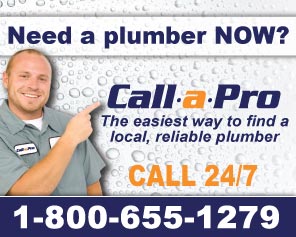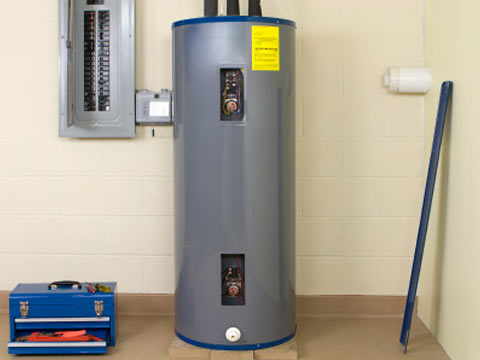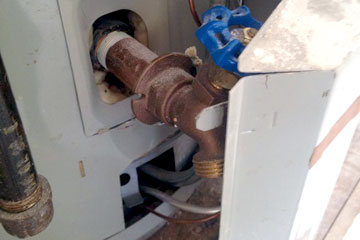Water heaters operate by taking cold water flow into your house, passing it over a heating element, and sending it to faucets and other water hookups. The machine itself is ingenious in its simplicity. In both gas and electric water heaters, cold water flows into the top of the tank and falls to the bottom. In a gas appliance, the water is heated by a fire at the bottom of the tank; in an electric appliance, water passes through two or more heating elements inside the tank at various heights. When cold water is heated it rises to the top of the tank and is purged when a faucet or water hookup valve is opened. Therefore, water heaters can continually send hot water through the lines despite the cold water that flows into the tank. This only fails if the tank is fully emptied of hot water before the heating elements have time to warm the new water.
Another, newer technology to water heaters is the invention of the tankless water heater. Tankless water heaters operate by using very powerful heat exchangers – essentially the same idea as heating elements – which are activated when water begins to flow. The tankless water heater provides advantages due to its size. Because it can forgo the large tank of traditional water heaters, tankless units can be placed anywhere from a small crawlspace to the cabinet directly below sinks. So called “point-of-use” tankless water heaters are placed very near the destination outlet (faucet, shower, etc.) and provide low lag times, or the amount of time it takes to purge cold water from the hot water line. Still, there are disadvantages. Sometimes many tankless units are required to provide hot water to a large home, and currently, tankless units are a far cry more expensive than traditional tank water heaters.
Protective devices are necessary because water heaters can be dangerous appliances. The fact that pressurized, often scalding hot water is being contained in a tank allows the water heater to have potentially explosive force. Some pressure devices include the pressure relief valve and anode. The pressure relief valve is an opening on the side of the tank that is set to open at a certain pressure. Before a malfunctioning water heater can over pressurize the tank and cause an explosion, the relief valve will open and drain the tank. The anode is another important protection device exclusive to electric water heaters. By manipulating electrical properties, anodes can lengthen the life of the steel tank by diverting rust to the anode itself. However, as the anode rusts it will disintegrate - therefore it is called "sacrificial."
Only professional plumbers should install and repair water heaters! Installing or replacing a water heater often requires lengthening or shortening pipes. There are special requirements for bonding PVC piping to prevent leaks, and plumbers have experience in not only bonding PVC, but also cutting pipes. Also, performing any maintenance on gas water heaters requires knowledge of natural gas piping and connections. Natural gas is very flammable and inexperienced homeowners should not operate on gas lines. Electrical water heaters combine the force of 110 or 220 volts of electricity and water – never a good combination.
Water heaters also pose an inherent risk. Average water heaters are large and made of steel (i.e. they are really heavy). Plumbers normally have assistants who can help them move the heavy appliances, and all people involved should be insured against injury. On the other hand, the average homeowner is not only uninsured, but unprepared to undertake the task of moving something so large. The greatest risk of weight, however, is not just a strained back. Because most water heaters are fitted for small cabinet spaces, precise lifting is required to remove and reinstall the appliance. Without proper assistance, most homeowners have a high likelihood of having the water heater fall on their foot, or worse, roll on top of them. Avoiding plumber costs could mean accepting emergency room costs, as well as pain and suffering.
Another reason to have a professional plumber complete water heater maintenance is assurance that building codes and safety measures will be followed. Most water heaters require a manufacturer specified minimum distance to surrounding walls and fixtures – this measure exists to prevent fire. Most municipalities also have statutes known as building codes which may place stricter requirements on minimum distances. If an owner’s home is ever inspected for adherence to codes and the water heater is installed improperly, s/he could face a very large fine and costly reinstallation of the appliance.
Common problems which can be traced to the water heater include:
- The water is not heated.
- Hot water supplies are exhausted prematurely.
- Water is rust-colored.
- Water smells like sulfur (rotten eggs).
- Water heater makes rumbling or popping noise.
- Water heater makes high pitched whining noise. (electric water heater)
- Water leaks at the base of the water heater.
Some of these problems could potentially be solved by homeowners, but professional plumbers will provide a guaranteed repair and do the job safely. Before each problem can be tackled, the water heater must be drained properly. Missing one step in draining the water heater could result in damage to equipment or physical injury. Remember, water heaters hold pressurized, scalding hot water and electrical or natural gas equipment. Avoid injury or death and let the professionals do the job they are trained to do!
In conclusion, saving money by cutting corners is never acceptable for a professional or do-it-yourself homeowner. The loss of life and limb that can result from improper installation or repair technique is not worth the extra dollars saved. The absolute best course of action that any homeowner can take is to hire a professional, licensed and insured plumber that will provide reliable, guaranteed services.



